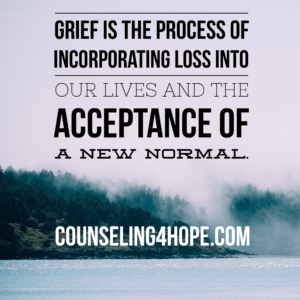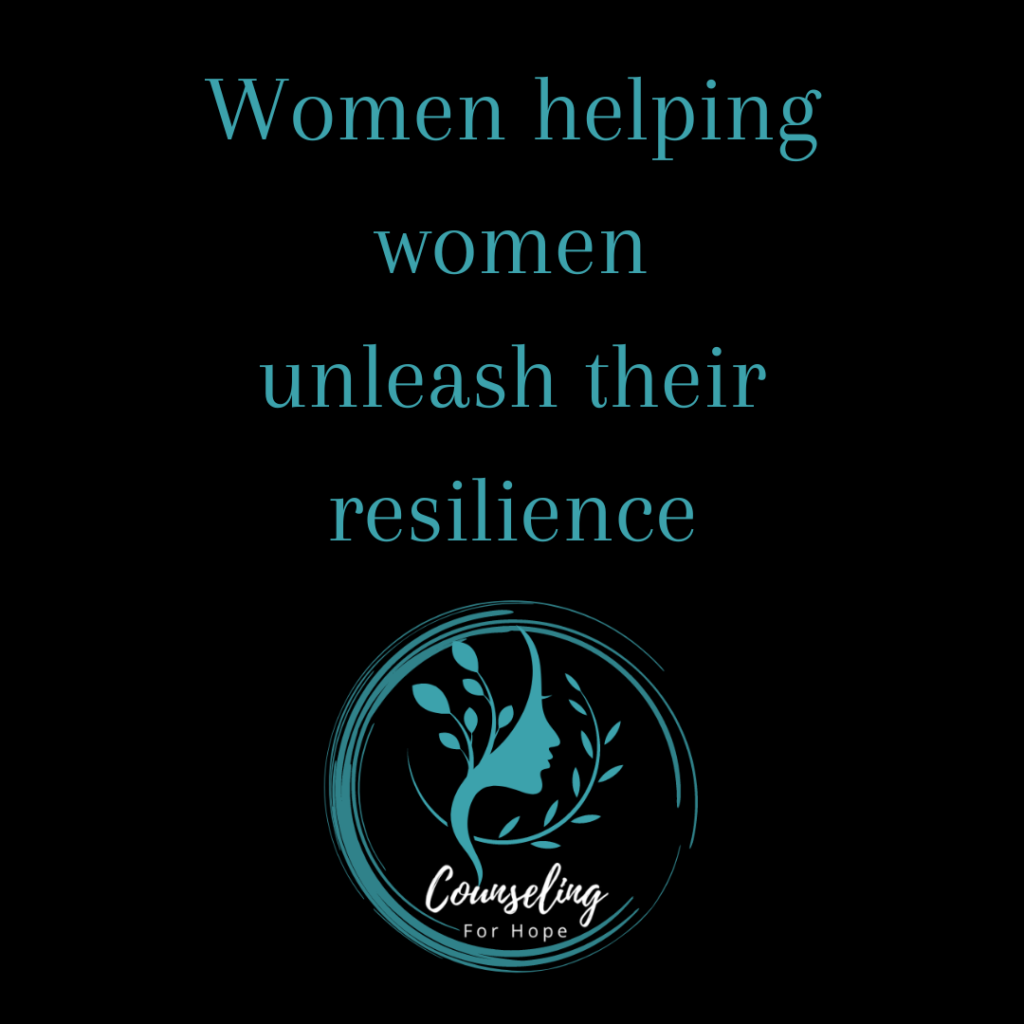Loss. Death. Mourning. Sadness. All these words come to mind for many of us when we think of grief. Most of us associate grief with a big loss, like the death of someone we love. In America, there is an unspoken expectation that grief happen quickly or privately. We rally around people during crisis and loss but weeks or months later the unspoken message is move on. We are a culture comfortable with surface level conversations but uncomfortable with hurt, pain, and sadness. Grief is probably the most misunderstood idea.
We are a culture comfortable with surface level conversations but uncomfortable with hurt. Share on XWhat is grief?
Grief is the process of incorporating loss into our lives and the acceptance of a new normal. Loss happens throughout our lives in many different forms. I define loss as any change connected to something or someone of value to us that must be accepted. Because loss is connected to what we value, loss is an individual experience. What I might consider a loss might not be a loss to you. There are universal values that we all agree fall under the loss category: losing loved ones to death, a divorce, or a sudden violent trauma.
Grief is the process of incorporating loss into our lives and the acceptance of a new normal. Share on XAny change involves some level of loss because of the nature of change. Even a good change, a marriage or the birth of a child involves change and loss: the loss of freedom or independence in a way that one had before. So even with something we universally agree is a good change there is a grief process to incorporate that change into our lives.
Any change involves some level of loss because of the nature of change. Share on XWhat happens when we deny the loss and suppress our feelings?
Well, emotions are signals and give us energy to act. To deny the signal is like hitting the snooze button on an alarm clock. The emotion will come again. If there is continual emotional suppression, then your body may decide you aren’t listening to the emotional signal so it will try to communicate with you physically. The brain and body are meant to express a range of emotions based on the situations we are presented with in life. Emotions help our brain and body process life. To deny this critical dimension of our bodies confuses our brain and puts it in a higher level of stress. This stress comes with heightened levels of cortisol and adrenaline, which can impact your physical well-being. I am not a medical doctor but I do know that if your body senses that it is under attack then heart rate, blood pressure, muscle tenseness, and breathing all increase in an effort to prepare us to protect ourselves. This level of arousal over time is detrimental to our body. It affects sleep, weight, immunity, energy, and over-all functioning.
Emotions are signals and give us energy to act. To deny the signal is like hitting snooze. Share on XSomehow our culture has correlated strength with no-emotionality and weakness with emotional expression. This is how we function and what so many teach our children. “Don’t cry.” “Be strong.” So when loss hits (of any kind), we feel “crazy” when we feel legitimate loss emotions….especially if the loss is not a societally acceptable loss. What is sad is we are anything but “crazy” we are functioning normally. Our mind and body is doing exactly what it was created to do.
Back to the concept of grief: learning to incorporate loss into our lives and the acceptance of a new normal. This process is critical for living in the world and facing all the loss that comes with normal life. However, delaying or denying the experience of grief actually adds to suffering instead of preventing it.
Grief is critical for living in the world and facing all the loss that comes with normal life Share on XGrief involves:
- The permission to feel whatever you feel. Feelings are what they are. Allow yourself to identify all the feelings you feel throughout the day and take note of them. Use an emotion word list to help you (especially if naming the feeling is new to you). Take note of the emotion you feel and write them down. You will find yourself feeling a range of emotions and that is normal. No feeling is bad. Hear and accept your feelings. You may feel shock, disbelief, sadness, anger, guilt, fear, denial, relief, gratitude, confused, overwhelmed, love, lonely, or abandoned. I want to repeat….all these feelings are NORMAL. There is no right or wrong way to feel when faced with loss.There is no right or wrong way to feel when faced with loss. Share on X
- Connect with supportive safe people. We are not meant to live in isolation but in supportive community. I think this may be where our culture wars against us. In America, we value the independent individual over the group. The trouble is independence breed’s isolation. In isolation, humans struggle. Just look at movies like Castaway and Martian. We need each other. Especially in times of stress and trouble. Sharing our emotions and thoughts about loss with supportive safe people helps us in multiple ways.
- Processing our pain and loss with people helps us recognize that our emotions are normal
- We experience comfort and support from others.
- We are better able to mentally incorporate the loss into our lives when we are able to talk about it and share with others.
- The search for meaning. We are meaning creators. We search for meaning in everything and often this is a subtle and unconscious process. Often during loss we subtly take meaning from the experience about the world and ourselves. The danger of suppressing emotion and putting on a strong face to the world is the creation of an unhealthy meaning. Processing it alone (and only in our own heads) increases the likelihood that we will arrive at a meaning that is harmful. When we don’t share our emotions and thoughts with others, our inner critic grows and increases our shame experiences. For example: if someone loses a job to a layoff and they never grieve or share it then they may determine that there is something wrong with them and begin to question their worth and value.When we don’t share our emotions and thoughts with others, our inner critic grows. Share on X
- Self-Care. The grief process, although a necessary one, is an emotionally and physically exhausting process. Giving yourself permission to take care of you during this process is important. Pay attention to your sleeping, eating, exercise, feelings, connection time, and enjoyable activities.Giving yourself permission to take care of you during grief is important. Share on X
- Expect the process to be one that is up and down. Incorporating loss into life is not a straight-line journey but a roller coaster ride. That’s okay and normal. No matter the loss, some days will be easier than others. Expect hard days, they won’t last forever. Self-Care during hard days may look different than easy days.Incorporating loss into life is not a straight-line journey but a roller coaster ride. Share on X
- Compassionate Acceptance. Ultimately the goal of grief is accepting life as it is (not how we wish it were) and adjusting to the new normal. Whether it’s life without a loved one or life after retirement or life in a new town or life with a new job or life with the family we have (instead of the one we wish for) or any other reality we must accept…grief is the process that gets us here. Yet the grief journey is not one that can be undertaken without compassion…compassion for us, compassion received from others, and compassion from God. Jesus was a “man of sorrows…acquainted with grief” who “bore our grief’s and carried our sorrows”. Life is hard and pain is real. Yet, we do not have a God that doesn’t know what it is like to suffer or feel overwhelming sorrow. We have a God who can sympathize with us and wants us to “draw near…to find help in our time of need”. (Isaiah 53:3-4; Hebrews 4:14-16)Ultimately the goal of grief is accepting life as it is (not how we wish it were) and adjusting to the new normal. Share on X The grief journey is not one that can be undertaken without compassion. Share on X
Life comes with loss and struggle is part of life for everyone. Grief enables us to incorporate loss into life and accept life for what it is. Grief unites us. We all experience it for so many different things. Grief brings about our vulnerabilities and drives us to others and God for comfort. To deny these realities increases your suffering. Life can be beautiful even in the midst of pain and struggle.
Life can be beautiful even in the midst of pain and struggle. Share on X“The risk of love is loss, and the price of loss is grief—But the pain of grief is only a shadow when compared with the pain of never risking love.” Hilary Stanton Zunin
There is a sacredness in tears. They are not the mark of weakness, but of power. They speak more eloquently than ten thousand tongues. They are the messengers of overwhelming grief of deep contrition, and of unspeakable love” Washington Irving






